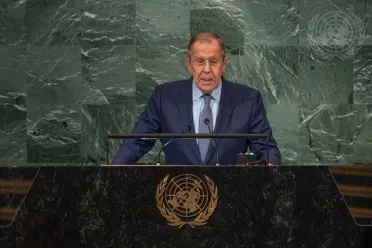Statement
Statement summary
SERGEY V. LAVROV, Minister for Foreign Affairs of the Russian Federation, said the United States, declaring victory in the cold war, has behaved as if it has the sacred right to act with impunity whenever and wherever it wants. Recalling the war of aggression — in Yugoslavia, Iraq and Libya — which claimed many hundreds of thousands of lives, he also asked: “What is the outcome of the adventurism of the United States in the Middle East? Has the human rights situation improved? Is the rule of law better? Has the socioeconomic situation stabilized?” Pointing to the quest to spread NATO to the East and bring the military infrastructure to the borders of the Russian Federation, he warned that Washington, D.C., now has the goal of subjugating the Asian areas. At the June NATO summit in Madrid — under the slogan of Indo-Pacific Strategy — it aimed to undermine what has been ASEAN policy for decades, namely open and regional architecture. In addition, Washington, D.C. — promising its military support — is playing with fire around Taiwan. Washington, D.C., is trying to turn the entire world into its own backyard through unlawful unilateral sanctions, preventing countries from getting access to medications, vaccines and food, as seen in the blockade of Cuba. Further, despite the efforts made by the Secretary-General, namely the Istanbul agreement, the impediments against Russian grain and fertilizers have not been lifted. For several weeks, 300,000 tons of fertilizer are being held up in European ports, he said, proposing they be forwarded free of charge to the countries in Africa that need it.
Detailing Moscow’s history of non-interference, he recalled that his country voluntarily dissolved the Treaty of Warsaw, thus removing the reason for NATO’s existence. Against the position of London and Paris, Moscow also supported the re-unification of Germany without any preconditions. It withdrew its military from Europe, Asia and Latin America, and recognized the independence of former Soviet republics. Moreover, Moscow leaders believed the promises of Western leaders not to expand — not by an inch — NATO in the East. However, when that started, it agreed to legitimize it by signing the Founding Act between the Russian Federation and NATO. Moscow warned the West it was unacceptable to bring the military infrastructure closer to the Russian borders. Turning to the 2014 crisis, he said that the West watched in silence as members of the coup started bombing eastern Ukraine. He cited Kyiv’s attempt to ban the Russian language, education, mass media and culture, along with chasing Russians out of Crimea and waging war against Donbas. Further, Moscow played a role in stopping Kyiv’s neo-Nazis in the east of Ukraine, he said, demanding that the Minsk package of measures be implemented.
The incapacity of Western countries to negotiate and the continued war by the Kyiv regime against their own people left Moscow with no choice but to recognize the independence of the Luhansk and Donetsk people’s republics and start a special military operation to protect the Russian and other people in Donbas, he stressed. He also underlined the intention to remove the threat against Russian security which NATO has been consistently creating in Ukraine. For the Anglo‑Saxons, Ukraine is just an expandable material, as they are fighting against the Russian Federation. NATO declared his country “an immediate threat on their way to total domination”. At the same time, the collective West, headed by Washington, D.C., is sending frightening signals to other countries. One of the consequences of the crusade by the West against the objectionable is the growing decline of multilateral institutions that have been turned by Washington, D.C, and allies into tools to implement their own selfish interest. On broadening the representation of the Security Council, he identified India and Brazil — key international actors — as worthy candidates to the permanent membership.
Full statement
Read the full statement, in PDF format.
Photo

Previous sessions
Access the statements from previous sessions.
